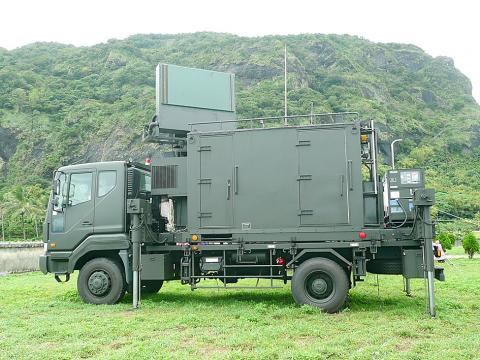As the Chinese People’s Liberation Army Air Force (PLAAF) deploys J-20 stealth fighters in increasing numbers, Taiwan is fielding mobile passive radar systems to defend its airspace against stealth aircraft, a senior Ministry of National Defense official said.
Two radar units — developed by the ministry-affiliated Chungshan Institute of Science and Technology — would be deployed some time this year for operational testing, the officials said on condition of anonymity.
The system would enter mass production in 2020 if the military decides that it meets its operational needs, he said.

Photo copied from the Chungshan Institute of Science and Technology’s Web site
The institute has been working for years to incorporate Western military technological trends in its mobile passive radar system, the official added.
The military’s concept for counter-stealth air defense is comprised of active and passive systems, which would detect, track and lock on to stealth targets at long range, the official said.
The active means would consist of upgraded F-16 warplanes, which have advanced radar systems capable of detecting stealth aircraft, he said, referring to F-16V aircraft and the APG-83 Scalable Agile Beam Radar.
The radar systems would comprise the passive end of the system, the official said.
The mobile units will be remotely linked to active phased array radar systems and “magnify” the radar cross-section of detected objects without emitting radiation, he said.
They are less vulnerable to electronic warfare interference and anti-radiation missile attacks, a fact sheet published by the institute said.
China claims that the J-20, its indigenous stealth strike fighter, performs on a par with the US’ F-22 Raptor, the official said, adding that the jet is likely capable of attacking targets at sea.
The radar systems are a response to the threat posed by Chinese stealth fighters, including its modified Su-35 fighters, which the PLAAF has been coating with radiation-absorbing paint to give them a measure of stealth, he said.
While the J-20 is in limited service, there is no doubt that the PLAAF will increase the size of its stealth fighter fleet and supplement it with other warplanes, which would pose a significant threat to Taiwan’s air defense, he said.
“These developments will erode the detection range of our advanced warning radar systems or even lead to the complete loss of advanced warning and quick reaction capabilities,” he said. “The military must plan for and deploy countermeasures to preempt them.”
The PLAAF on Friday last week dispatched formations of Su-35 fighters and H-6K bombers to fly around Taiwan, the first time that the former was sent on such a patrol.
The Chinese military claims that the J-20 has been deployed in air combat drills at sea.

The US government has signed defense cooperation agreements with Japan and the Philippines to boost the deterrence capabilities of countries in the first island chain, a report by the National Security Bureau (NSB) showed. The main countries on the first island chain include the two nations and Taiwan. The bureau is to present the report at a meeting of the legislature’s Foreign Affairs and National Defense Committee tomorrow. The US military has deployed Typhon missile systems to Japan’s Yamaguchi Prefecture and Zambales province in the Philippines during their joint military exercises. It has also installed NMESIS anti-ship systems in Japan’s Okinawa

TRAGEDY STRIKES TAIPEI: The suspect died after falling off a building after he threw smoke grenades into Taipei Main Station and went on a killing spree in Zhongshan A 27-year-old suspect allegedly threw smoke grenades in Taipei Main Station and then proceeded to Zhongshan MRT Station in a random killing spree that resulted in the death of the suspect and two other civilians, and seven injured, including one in critical condition, as of press time last night. The suspect, identified as a man surnamed Chang Wen (張文), allegedly began the attack at Taipei Main Station, the Taipei Fire Department said, adding that it received a report at 5:24pm that smoke grenades had been thrown in the station. One man in his 50s was rushed to hospital after a cardiac arrest

‘WIN-WIN’: The Philippines, and central and eastern European countries are important potential drone cooperation partners, Minister of Foreign Affairs Lin Chia-lung said Minister of Foreign Affairs Lin Chia-lung (林佳龍) in an interview published yesterday confirmed that there are joint ventures between Taiwan and Poland in the drone industry. Lin made the remark in an exclusive interview with the Chinese-language Liberty Times (the Taipei Times’ sister paper). The government-backed Taiwan Excellence Drone International Business Opportunities Alliance and the Polish Chamber of Unmanned Systems on Wednesday last week signed a memorandum of understanding in Poland to develop a “non-China” supply chain for drones and work together on key technologies. Asked if Taiwan prioritized Poland among central and eastern European countries in drone collaboration, Lin

ON ALERT: Taiwan’s partners would issue warnings if China attempted to use Interpol to target Taiwanese, and the global body has mechanisms to prevent it, an official said China has stationed two to four people specializing in Taiwan affairs at its embassies in several democratic countries to monitor and harass Taiwanese, actions that the host nations would not tolerate, National Security Bureau (NSB) Director-General Tsai Ming-yen (蔡明彥) said yesterday. Tsai made the comments at a meeting of the legislature’s Foreign Affairs and National Defense Committee, which asked him and Minister of National Defense Wellington Koo (顧立雄) to report on potential conflicts in the Taiwan Strait and military preparedness. Democratic Progressive Party (DPP) Legislator Michelle Lin (林楚茵) expressed concern that Beijing has posted personnel from China’s Taiwan Affairs Office to its